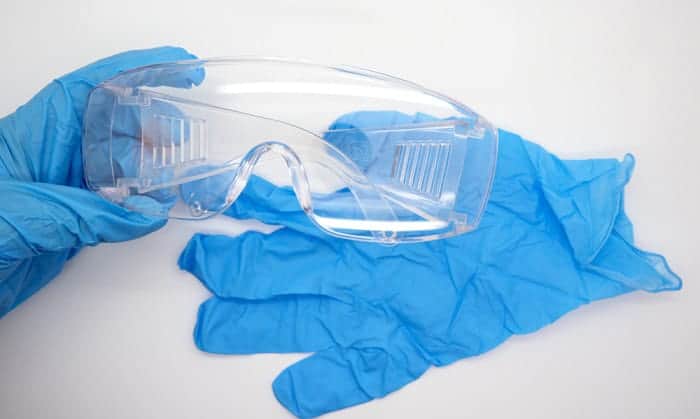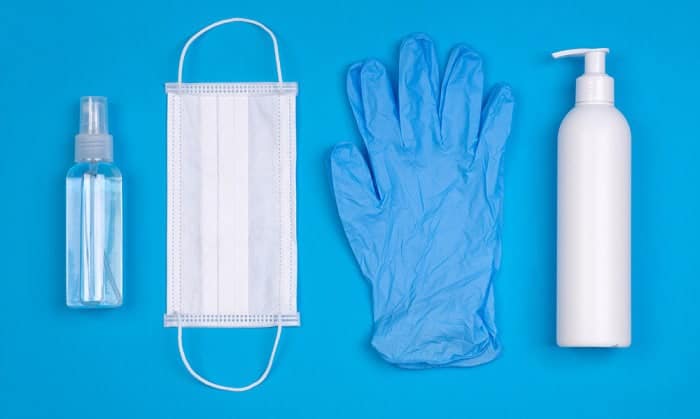Dealing with toxic chemicals requires complete protection for our hands and eyes. We must not be neglectful when choosing the right pair of gloves to cover us. And to make the right decision on which pair to buy, we must answer the question: “What type of gloves protects your hands from hazardous chemicals?”
For a quick guide on the best protective gear for our hands, here’re what we need to know:
- Nitrile gloves: Among the toughest products that resist infectious solutions and toxic chemicals.
- Neoprene gloves: Ideal options for mild corrosive chemicals and materials. They resist the intrusion of oils and solvents.
- Rubber gloves: Effective protective wear that withstands mild corrosive chemicals and materials.
Table of Contents
What Type of Gloves Protects Your Hands from Hazardous Chemicals
Nitrile Gloves Protect Against Chemicals
Nitrile gloves are from synthetic copolymers that underwent processing steps before being released to the market. They are affordable and safe for people with allergies. Regarding the food-safe feature, make sure you check the pair’s qualifications before purchasing it to handle food.
Also, originated from rubber, nitrile gloves are waterproof naturally. Thus they can shield us from oils and grease just fine. Due to all these features, people in the automotive and mechanics fields can utilize nitrile gloves for their daily work to avoid harming their skin.
Damages caused by direct exposure to toxic chemicals can be prevented with the right pair of nitrile gloves, too. For instance, they resist Methanol, acids, caustics, and more. But, please note that they cannot keep your hands safe from formaldehyde.
Neoprene Gloves Protect Against Chemicals and Mild Corrosive Agents
Neoprene gloves are another type of synthetic rubber that is chemical-resistant. A high-quality pair can resist a wide range of toxic agents, including caustics, acids, oils, alcohol, solvents, and oxidation.
While handling chemicals, neoprene mitts can shield against acids such as Nitric acids, Hydrochloric acids, and Sulfuric acids. Make sure you check the level of concentration of those acids that your chosen pair can handle.
Most black terry-lined neoprene gloves are used for heavy duties, as they withstand heat, puncture, and abrasion well. A premium pair can deal with hot liquid, allowing an intermittent contact reaching 300 – 400°F.
Furthermore, these lab safety gloves can tolerate sunlight exposure and changing weather, thus ideal for outdoor tasks. People can wear these gloves to perform intricate projects since they are pretty pliable and dexterous.
Rubber Gloves Shield Hands Against Corrosive Chemicals and Materials
Natural rubber gloves or latex gloves protect against different corrosive agents and strong bases. For instance, we can wear these gloves to work with projects involving rocket fuels and peroxide. That’s why workers can rely on these pairs for tasks such as dying hairs and cleaning.
Notably, rubber gloves prove to be effective in preventing acids, salts, alkalis, and ketones. That means they suffice the requirements of duties with small volumes of solvents and toxic compounds. Many people also wear rubber gloves to handle flammable mixtures.
It is worth mentioning that these gloves are comfortable to wear for long hours. They offer a high level of tensile strength and elasticity, thus allowing us to have freedom in movements while performing detailed tasks. Also, they can resist high temperatures well.
However, please note that some natural rubber gloves are not good for people with severe allergies. So, if you have a condition, make sure to choose Hypoallergenic and powerless gloves with suitable liners that keep you safe.
Other Types of Heat-Resistant Gloves
Besides all the commonly-used gloves above, some other pieces might help you shield against hazardous chemicals.
First of all, Butyl gloves are not that popular, but they bear high permeation resistance to many toxic agents. That means, it can deal with a large amount of organic solution, toxic solvents, and dangerous materials.
Also, Dupont Viton ® is another heavy-duty material, being the most chemical-resistant rubber. Gloves made of this material can offer a superior shield against high corrosive agents and toxic chemicals. They are capable of handling most hazardous materials like Butyl gloves with extra protection against material spills.
Conclusion
After knowing what type of gloves protects your hands from hazardous chemicals, it is advisable that we look through the best ones that work for our needs. Besides wearing gloves, we should equip ourselves with eye protection and even a bodysuit or apron when dealing with different kinds of dangerous agents.

Hi, I am Alexander, forty-seven years old this year. I have been in the construction industry for twenty-five years and have provided a wide range of services. When it comes to expert guidance on site safety gear, you can put your trust in me.




